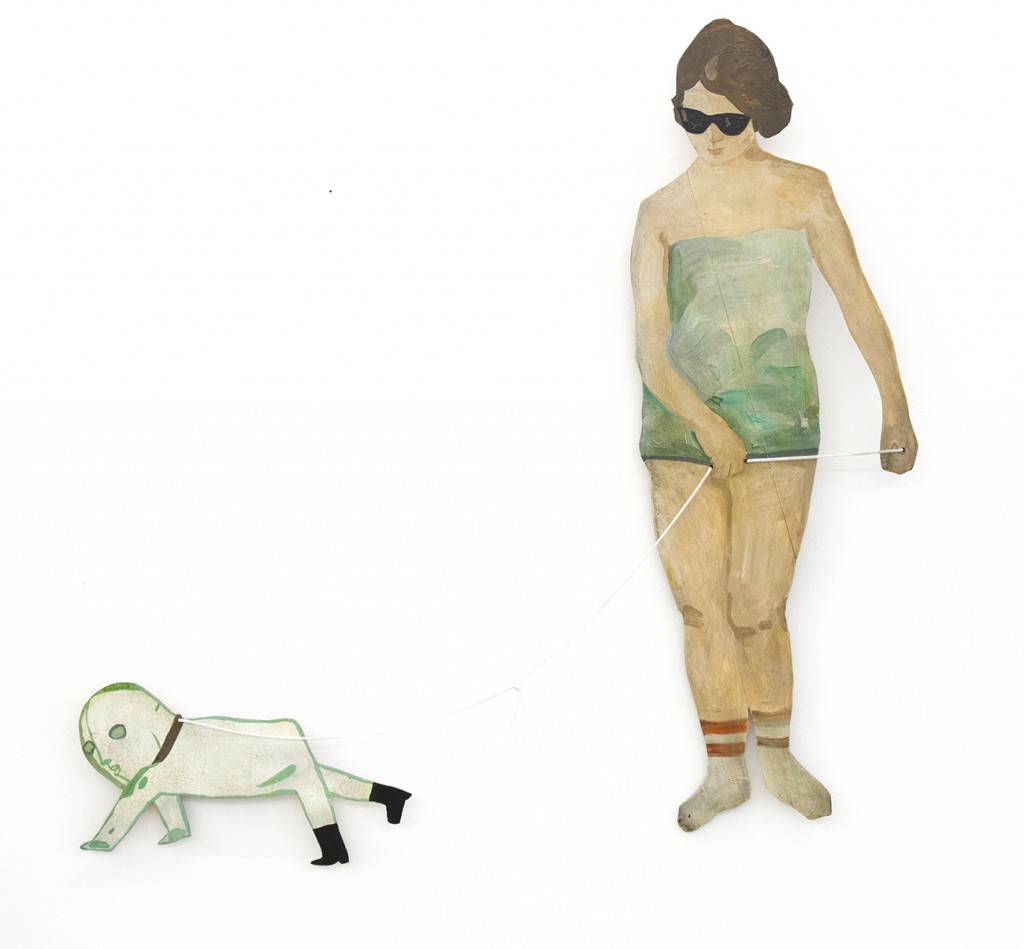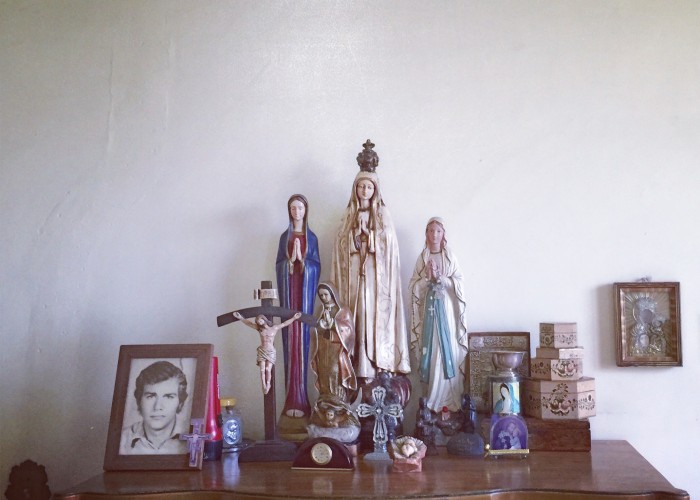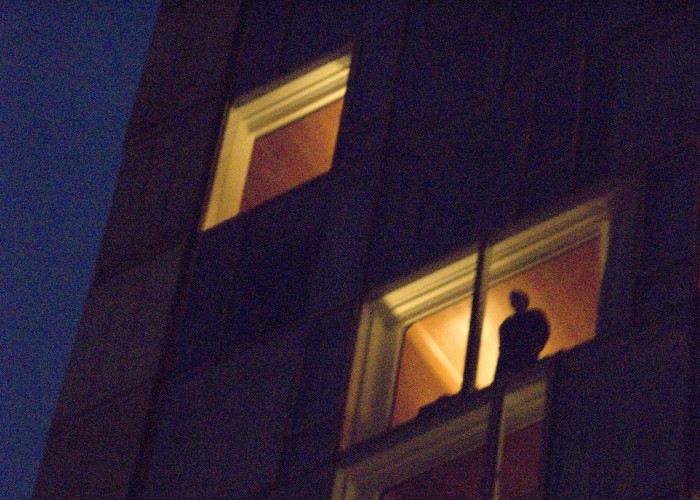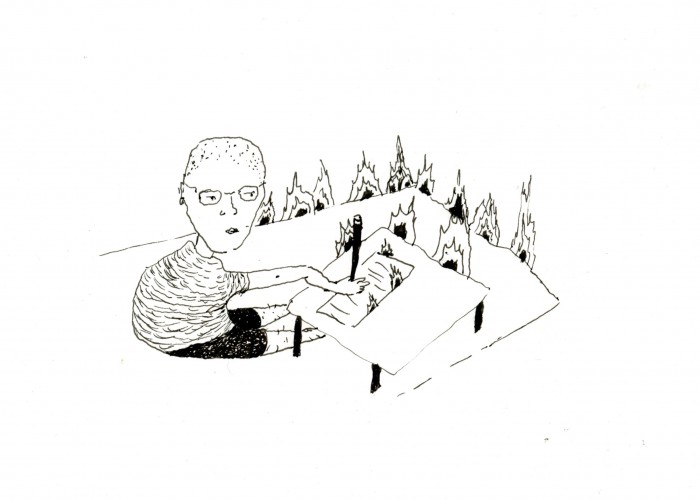The Makeup Wars
Dany Salvatierra
translated by Sarah Bruni
Blanca started unbuttoning her dress only when she was sure she wasn’t being spied on by the line of horrified women crowded in front of the entrance to the store’s dressing rooms. The curious women formed an endless line, a procession of polyester skirts and the low heels essential to withstanding the long wait. They all carried heaps of clothing they were eager to rip into with their ample bodies—unlike Blanca, who had never wanted to wear that black mourner’s dress. She had put it on with her eyes closed, imagining for a millisecond that she was completely alone. Partly because it terrified her to see herself in the mirror, but also because Blanca knew that it wouldn’t be long before she, on her left, started to protest. Outside, her mother waited patiently with her fingers laced over her purse, not daring to hurry her.
Inside the dressing room, unfortunately for her, the same voice as always whispered into Blanca’s ear. It was an unreal, diffuse babbling with a tone that hid its audacity. Just as she’d expected, the voice began to complain about the neon-green blouse Blanca held clenched in her fist, a garment she had chosen herself this time, instead of the dark, witchlike dresses she forced Blanca to wear. Before leaving for the mall her mother had, for once, complied with her teenage demands, since Blanca turned fourteen that day. To everyone’s surprise, she, the voice Blanca carried on her back, didn’t offer a single objection, and even kept quiet on the way—while her mother drove the van roomy enough to transport Blanca with relative ease. They’d parked in a handicapped space when they arrived, not because they needed it, but because it calmed her mother’s nerves when no one saw them.
*
As soon as Blanca removed the black dress, she let it fall to the carpeted dressing room floor flooded with hangers, motionless as clear plastic insects. She took advantage of the same impulse to wipe off the gray lipstick she had worn since she was eleven. Her mother had decided it was harmless for children to wear makeup, especially if they spent the day locked up in the house, not even allowed to get close to the curtains. They had already caused more than one accident in the neighborhood. The kids who lived nearby fell from their bikes and skateboards each time they had the misfortune of seeing Blanca at the window, splitting open their heads and breaking their hips, collarbones, or fibulas after losing control of their vehicles. Others dropped their cellphones in shock, smashing them into pieces on the asphalt, and ran away sobbing for reasons their mothers never could understand. In fact, a committee of mothers had shown up at the house a few months ago to deliver a petition—signed by hundreds and supervised by the pastor. Her mother was stunned, reading and rereading the missive that commanded Blanca to hide herself from the view of passersby, under the threat of a municipal hearing and the presentation of the matter to the bishop himself.
It was then—as a distraction from the misfortune of not being able to see the sky—that Blanca had accepted the compact case of pearly eye shadow her mother had offered with genuine sympathy. But her will was thwarted when she was quick to say that color made her sick. Our future is black, she said, so we will be too. But the imposition of black wasn’t limited to their argument over makeup. It spread like an epidemic toward her closet and dyed Blanca’s clothes the same color. Her mother acted as intermediary and reluctantly arranged: one day her, one day you. So she had her turn Mondays, Wednesdays, and, most critically, Fridays, the most important day, ever since the younger generation started looking down on Saturdays as just another Sunday. Blanca had to satisfy herself with Tuesdays, Thursdays, Saturdays, and Sunday mornings. Since the week had an uneven number of days, they ended up splitting the hours on Sunday, and of course she had the afternoons. Makeup, however, was another story.
*
Still reflected in the dressing room mirror, she controlled the fight again without much effort. Her left arm had been her quickest limb since she came into the world and, as usual, she forced Blanca to smear her face with a whitish cake, topping her off with black eyeliner, and leaving her looking worse than a priestess in a satanic cult.
Seeing the iridescent glimmer in the neon of the new dress, Blanca’s hand slipped, trembling, into her little purse, took out a piece of toilet paper, and proceeded to rub her face with it.
“What are you doing? I told you not to take off your makeup!” she threatened.
“It’s my birthday,” responded Blanca.
Immediately, she opened the delicate compact case of turquoise eye shadows. It had a tiny mirror inside that she’d stolen from the perfume counter, because even the salespeople had turned their backs on them, pretending to ignore her, although of course they were scared to death. Then Blanca expertly applied the eye shadow to her left eyelid, as she had once seen a former soap opera actress do in an early morning infomercial.
“But it’s also my birthday!” she protested.
“This year it’s my turn.”
Blanca grasped the neon blouse in her right hand and adjusted it as best she could, ignoring the protests of her companion. The fabric shone majestically under the lights around the dressing room mirror. She closed her eyes again. If Blanca concentrated enough, it was as if she weren’t on her left. This way, without even trying to, she’d ended up practicing the concentration exercises recommended by the psychoanalyst who came to the house ever since she could remember.
Blanca looked at her half made-up face. She still needed to do the other eye, and much more, since she had to work twice as hard to assert authority over her makeup. She breathed deeply, thinking she’d finally triumphed over the monochromatic color she was forced to hide under—blending into the asphalt on the street, the walls of the houses, the furniture in the living room.
Suddenly, she felt it. A sticky tongue running violently along the left side of her neck, invincible—up and down—moistening her skin with saliva. It gave her goose bumps. She started biting her collarbone, moving up her neck until finally penetrating the orifice of her ear like the virile member of an impatient lover. Blanca noticed a prickling in her flesh—a feeling she’d just discovered a few days ago. It had happened in the shower, thanks to an elongated bottle of shampoo that she had used to attack her between the legs, without asking.
She had to surrender to the attack, since she was beginning to enjoy the tongue’s assault on her ear. Despite the sour taste of earwax on her tongue, her sex swelled. A hand that appeared suddenly on her left ripped the buttons from the brand new neon blouse. Fingers pushed into the hard fold of her crotch while touching her doughy right breast—which straightened up fully, like a sea creature stalking its prey.
Blanca threw back her head and bit the back of her hand. Not even the reproaches coming from outside the dressing room, the racket of the women, their little calves swollen from so much waiting, could interrupt her breathless anxiety. Suddenly it wasn’t just a tongue but also a few teeth that trapped her right nipple, the last bastion of the crusade. Sweat soaked her entire back, extinguishing the glow of the green blouse that never again would shine outside of the mall. Victorious, she abandoned the attack and mumbled into her ear, putting an end to the conflict, “You can wear whatever you want, since it’s your birthday. But I’m in charge of makeup.”
With the sudden freedom to choose the colors in her wardrobe, at least for the day, a sense of good fortune settled deep inside her. What terrified her most about the makeup wars was having to paint half her face like a comic book antihero for the rest of her life. She shuddered to imagine her mother’s expression when years later they’d send her to the seamstress to have clothing made of contrasting colors, split down the middle, a shock for the poor woman already used to sewing the convoluted clothing their strange body required.
Even so, something could be done. Her period had come just last year, leaving traces of thick caramel on her pajama pants, because she didn’t like to wear underwear. Blanca also began to suspect that she didn’t share her taste in boys. She was usually drawn to pale, super skinny guys with a tragic, vampiric look, and never showed any interest in soap operas heartthrobs, the intellectuals with long hair and reactionary ideas who sat on benches and read books with red covers, or the gang of straggly guys with backwards caps and extra-large clothes who skated in the park. Blanca figured there would be a nuclear blast when one of these types or some other open-minded guy approached her to go out—because after all, she had to dream—though even in her dreams she would object till the very end. Choking back tears, Blanca told herself to save these sorts of worries for later.
The saddest part of it all was that two hours had already passed since she’d arrived at the mall brimming with expectations, but it was almost noon and her birthday would soon be over. She looked at herself again in the mirror. It comforted her to imagine that people would focus first on the color of the new shirt, rather than on the black makeup she’d have to reapply before going back home. Blanca hadn’t finished thinking about how she would make the neon green blend with her makeup when her mother, tired of waiting, jerked open the curtain of the dressing room and exclaimed, “What are you two doing in here?”
Blanca felt the fire that still moved through her lower belly reignite as if in reply. Her left hand was passing over the territory that her tongue had failed to reach, though Blanca already knew things would be different if she took gymnastics classes in order to be able to touch her head to her crotch like a contortionist. She, for her part, said nothing, and only withdrew her hand with a jerk. Blanca’s face quickly reddened, so she took the initiative to leave the dressing room, hurling herself through the crowded aisles of shoppers, walking in circles without stopping to look at her sister, whose lips were still damp with the taste of her nipple. She brought her right hand to her waist and steered both their legs as if parading along a demented runway. Rather than facing straight ahead, her sister turned to the right, resting her eyes on Blanca in an attempt to apologize, because the shirt really had fit them very well. However, she didn’t even need to part her lips because each of them could divine the thoughts of the other before she moved her mouth.
Catching sight in that moment of the thoughts crossing the mind of her sister—who licked her lips, remembering the taste of her skin—Blanca contained her desire to return home. She continued walking outside the dressing rooms until she arrived at the makeup counter and the section for hair products, forcing an exaggerated pout that most resembled an imitation of the arrogant models whose faces were plastered up and down the walls of the store.
The performance turned out to be comical even for her mother—the heads of her daughters swaying over their single trunk, indifferent to the bewilderment of the rest of the women who watched them incredulously with open mouths. The new shirt was barely held in place below her bust by a single button; in fact, her mother thought, it clung sensuously to the hips of their shared body. Blanca swallowed. It was impossible for her to continue hiding her shame when her sister, mentally, dared to reveal the caresses she planned to initiate that afternoon when they returned home, free to lock themselves away in their room for the rest of the day, leaving their mother to wait for them in the dining room decorated with cheap streamers, the table strewn with cherry Jell-O and ham sandwiches.
Her mother only managed a nervous laugh when mall security began to surround her at the precise instant that Blanca and her sister, with their heads high and the blouse still on, continued their erratic walk, swaying toward the exit. They emerged into the shadows of the parking lot, heading toward the van with a smile on their lips, captivated by the universe they were about to make sense of together. They even would have even joined hands, if it weren’t for the fact that their ribs and spine were already intertwined.
“I think that we’ll have to buy that blouse, after all,” her mother announced, not noticing the flood of whispers that would soon completely engulf her surging at her back.
* *
Image: “Lady Walking Baby” by Love Lundell. Curated by Marisa Espínola of Espacio en Blanco. (More)
[ + bar ]
The World Wide Widener
Patricia Marechal
The story of Widener Library starts with a tragedy. Widener is not only a place of study and one of the largest reservoirs of books and... Read More »
Islands
Gabriela Poma
The sleeping pills had finally worn off.
Her left eye opened, a slit, and she remembered to breathe.
Yo no entiendo nada de esto.
The world seemed... Read More »
Victoria Redel
BOTTOM LINE
As when my father goes back under and the doctor comes out to tell us he’s put a window in my father’s heart.
At last! The inscrutable years... Read More »
Anthony Madrid
7. There was an old person whose zeal Made him bug-eyed and tense at the wheel. He wasn’t much fun, and they said he was un- representative of their ideal.
Read More »








 sending...
sending...